
Peterhouse is the oldest constituent college of the University of Cambridge in England, founded in 1284 by Hugh de Balsham, Bishop of Ely. Peterhouse has around 300 undergraduate and 175 graduate students, and 54 fellows.

University College, informally known as Castle, is the oldest constituent college of Durham University in England. Centred on Durham Castle on Palace Green, it was founded in 1832 by William van Mildert, Bishop of Durham. As a constituent college of Durham University, it is listed as a higher education institution under section 216 of the Education Reform Act 1988. Almost all academic activities, such as research and tutoring, occur at a university level.

The Folger Shakespeare Library is an independent research library on Capitol Hill in Washington, D.C., United States. It has the world's largest collection of the printed works of William Shakespeare, and is a primary repository for rare materials from the early modern period (1500–1750) in Britain and Europe. The library was established by Henry Clay Folger in association with his wife, Emily Jordan Folger. It opened in 1932, two years after his death.
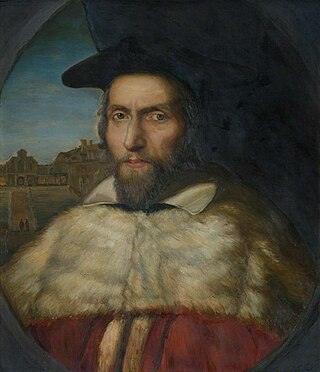
John Cosin was an English bishop.

Mr. William Shakespeare's Comedies, Histories, & Tragedies is a collection of plays by William Shakespeare, commonly referred to by modern scholars as the First Folio, published in 1623, about seven years after Shakespeare's death. It is considered one of the most influential books ever published.
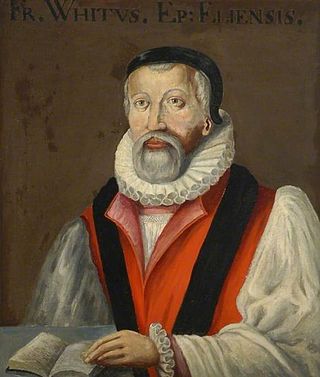
Francis White was an English bishop and controversialist.

Palace Green is an area of grass in the centre of Durham, England, flanked by Durham Cathedral and Durham Castle. The Cathedral and Castle together form a UNESCO World Heritage Site.

Auckland Castle, also known as Auckland Palace, is a former bishop's palace located in the town of Bishop Auckland in County Durham, England. The castle was a residence of the bishops of Durham from approximately 1183 and was their primary residence between 1832 and 2012, when the castle and its contents were sold to the Auckland Castle Trust. It is now a tourist attraction, but still houses the bishop's offices.

John Overall (1559–1619) was the 38th bishop of the see of Norwich from 1618 until his death one year later. He had previously served as Bishop of Coventry and Lichfield, as Dean of St Paul's Cathedral from 1601, as Master of Catharine Hall from 1598, and as Regius Professor of Divinity at Cambridge University from 1596. He also served on the Court of High Commission and as a Translator of the King James Version of the Bible.

The Birds of America is a book by naturalist and painter John James Audubon, containing illustrations of a wide variety of birds of the United States. It was first published as a series in sections between 1827 and 1838, in Edinburgh and London. Not all of the specimens illustrated in the work were collected by Audubon himself; some were sent to him by John Kirk Townsend, who had collected them on Nathaniel Jarvis Wyeth's 1834 expedition with Thomas Nuttall.

The Durham University Library is the centrally administered library of Durham University in England and is part of the university's Library and Collections department. Its two main libraries are Palace Green Library and the Bill Bryson Library. It was founded in January 1833 at Palace Green by a 160 volume donation by the then Bishop of Durham, William Van Mildert, and now holds over 1.6 million printed items. Since 1937, the university library has incorporated the historic Cosin's Library, founded by Bishop Cosin in 1669. Cosin's Library and the Sudan Archive held at Palace Green Library are designated collections under Arts Council England's Designation Scheme for collections of national and international significance; two collections at Durham University Oriental Museum, the Chinese collection and the Egyptian collection, are also designated.

Anthony Askew (1722–1774) was an English physician and is best known for having been a book collector. His collection was purchased by the British Museum and books purchased by George III of Great Britain were added to the King's Library.

The Museum of Archaeology, founded in 1833, is the archaeology museum of Durham University in England and was the second university museum in England to be open to the public. It is mostly focused on the archaeology of north east England with some national and international artefacts. The collections range from the prehistoric to the post-medieval, including the internationally important Oswald-Plique collection of Samian ware and the first complete Roman fleet diploma to be found in Britain. It is the repository for development-led archaeology finds in Durham City.

The Cobbe portrait is an early Jacobean panel painting of a gentleman which has been argued to be a life portrait of William Shakespeare. It is displayed at Hatchlands Park in Surrey, a National Trust property, and the portrait is so-called because of its ownership by Charles Cobbe, Church of Ireland (Anglican) Archbishop of Dublin (1686–1765). There are numerous early copies of the painting, most of which were once identified as Shakespeare.

Edmund Keene was an English churchman and academic, who was Master of Peterhouse, Cambridge and later served first as Bishop of Chester, then Bishop of Ely.
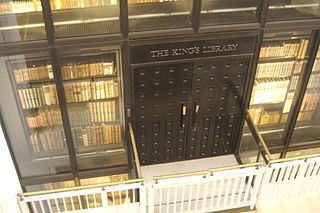
The King's Library was one of the most important collections of books and pamphlets of the Age of Enlightenment. Assembled by George III (r.1760–1820), this scholarly library of over 65,000 volumes was subsequently given to the British nation by his son, George IV. It was housed in a specially built gallery in the British Museum from 1827 to 1997 and now forms part of the British Library. The term "King's Library" was until recently also used to refer to the gallery in the British Museum built for the collection, which is now called the "Enlightenment Gallery" and displays a wide range of objects relating to the Enlightenment.
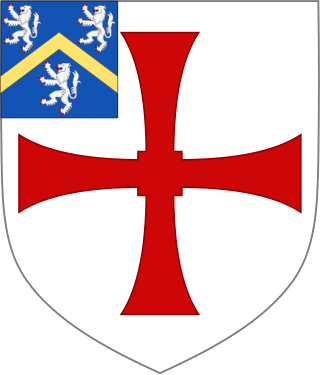
Durham University is a collegiate public research university in Durham, England, founded by an Act of Parliament in 1832 and incorporated by royal charter in 1837. It was the first recognised university to open in England for more than 600 years, after Oxford and Cambridge, and is thus the third-oldest university in England. As a collegiate university, its main functions are divided between the academic departments of the university and its 17 colleges. In general, the departments perform research and provide teaching to students, while the colleges are responsible for their domestic arrangements and welfare.
Denis Granville was an English non-juring cleric, Dean of Durham and then Jacobite exile.
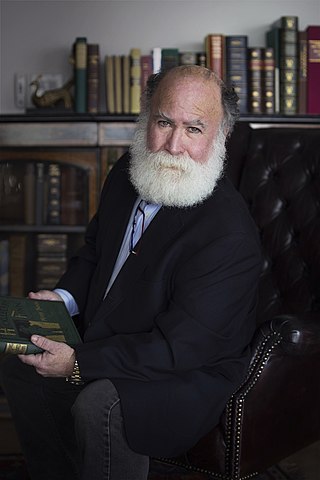
Stephan Loewentheil is an American antiquarian and a rare book and photograph collector. He is the founder and president of the 19th Century Rare Book and Photograph Shop, located in New York, New York and Baltimore, Maryland. Over a career spanning four decades, Loewentheil "has excelled … in unearthing obscure bibliographic details leading to the acquisition of under-appreciated rarities, seminal documents and early historic photographic images." Loewentheil has been described as a "super-collector," whose clients include celebrities, heads of state, American presidents, and some of the most prominent private collectors and institutional clients of rare books and photographs.

Bishop Cosin's Hall was a college of the University of Durham, opened in 1851 as the university's third college and named after 17th century Bishop of Durham John Cosin. It closed in 1864 due to a fall in student recruitment at the university.
























